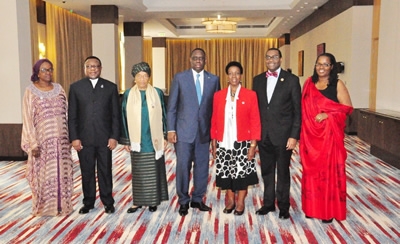
The President of Liberia, H.E Ellen Johnson Sirleaf, together with the African Capacity Building Foundation (ACBF) and Femme Africa Solidarité (FAS) convened a breakfast meeting to brief and update Heads off States and other key stakeholders on the ‘Empowering Women in Agriculture’ (EWA) initiative at a breakfast meeting held on the sidelines of the 27th AU Summit on the 16th of July in Kigali, Rwanda.
The meeting was attended by the President of Senegal, H.E. Macky Sall, the Representative of the President of Rwanda, H.E Paul Kagame, the Chairperson of the African Union Commission, represented by the Commissioner for Rural Economy and Agriculture, Mrs. Tumusiime Rhoda Peace, President of African Development Bank, Dr. Akinwunmi Adesina, the Executive Secretary of Economic Commission of Africa (UNECA), Dr. Carlos Lopez.
In her opening and welcoming remarks, the Chair of the EWA Initiative and convener, H.E Ellen Johnson-Sirleaf thanked and specially recognized the work of ACBF in providing technical support for EWA. She stated that the objective of the breakfast meeting was to discuss the implementation and financing of EWA and to also seek the support of the various governments, development partners and stakeholders in ensuring the take-off of EWA initiative.
She concluded by stating that the African women have been waiting and counting on the support of Heads of State and partners for the implementation of the EWA initiative which is meant to integrate women farmer’s interest into ongoing programmes of Agricultural transformation in Africa and lauded the efforts of AfDB in launching the Affirmative Finance for African Women (AFAWA) initiative and the possibility of AFAWA supporting EWA.
Prof Emmanuel Nnadozie, ACBF’s Executive Secretary, in his presentation of the update on EWA stated that as mandated by the Heads of States, the ACBF had undertaken a broad and comprehensive mapping study in 8 pilot countries studies, and accordingly designed a comprehensive capacity building program for EWA.
Prof. Nnadozie explained that EWA aims to enhance the policy and institutional space for gender-inclusive program design and program management and to contribute to the removal of barriers to the empowerment of women farmers.
He gave a brief description of the key focus areas of the regional program, the structure as well as management structure to implement the initiative which would be spread across the local, national and regional levels. He also indicated that EWA Program is structured to chronologically operate in the short, medium and long terms; in the short term, the EWA Phase I will be at national level in the selected pilot countries and this will be done in three phases, which are to align to the First 10 year implementation plan of Agenda 2063.
He concluded his presentation by stating that financial commitments is required to translate the EWA programme into action, and to begin to impact the livelihoods of women farmers. He maintained the commitment of ACBF to start implementation of the EWA Program.
In her closing remarks, Commissioner Tumusiime, representing the African Union Commission Chairperson, indicated that there was need for coordinating and mainstreaming the plethora of initiatives on empowering women. She stated that the AUC was pleased that EWA initiative is unique and would involve all institutions and organizations that are already working on empowering women in Agriculture. She underlined that the onus on African institutions and development partners to work together toward improving the lives of women was key.
The event gathered high-level participants, including stakeholders from civil society organizations, women associations, and development partners like the United Nations Commission for Africa (UNECA), FAO, AfDB, IFC, NEPAD, and civil society organizations.





